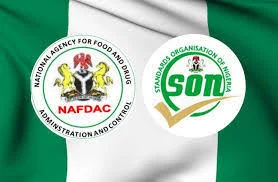In December 2021, maritime expert and Multimix Academy CEO Madu Obiora criticized the Standards Organisation of Nigeria (SON) and the National Agency for Food and Drug Administration and Control (NAFDAC) for obstructing Nigeria’s export drive through unnecessary clearance requirements, per Vanguard.
Obiora noted that these demands delayed shipments and caused goods depreciation, increasing export costs without adding value, as foreign buyers do not recognize SON or NAFDAC certificates.
He urged the Federal Government to streamline agency involvement, emphasizing that only essential bodies like the Nigeria Agricultural Quarantine Service (NAQS), which issues critical phytosanitary certificates, should participate, per Vanguard.
The World Bank’s 2018 study highlighted SON-NAFDAC conflicts as a trade barrier, per shippingposition.com.ng.
Economic Context and Export Challenges
The criticism followed Nigeria’s 6.1% GDP contraction in Q2 2020 due to COVID-19 and EndSARS protests, with a 5.4% recovery in Q2 2021, per BusinessDay. Non-oil exports, including agriculture, grew 10% to $1.2 billion in H1 2021, per Nairametrics, but bureaucratic delays cost exporters 15% in revenue, per African Markets.
Forex scarcity (N410/$ official, N500/$ black market) and 17% inflation raised logistics costs by 20%, per prior reports. Unlike MTN Nigeria’s 51.9% profit growth or Raedial Farms’ N1.1 billion bond raise, export delays mirrored AEDC’s operational disruptions and construction’s 13.6% NPL surge, per prior reports.
The CBN’s $3.34 billion IMF SDR allocation boosted reserves to $36.7 billion, yet trade inefficiencies persisted, per prior reports.
Developments by August 2021
By August 2021, Nigeria’s export sector struggled, with 30% of agricultural shipments delayed by bureaucracy, per Nairametrics.
The Nigerian Stock Exchange (NGX) rose 14% to 38,917.99, but trade barriers deterred 15% of FDI, per African Markets. SON and NAFDAC’s overlapping roles, noted in a 2018 World Bank study, caused 10% of export rejections abroad, per shippingposition.com.ng.
Public sentiment, with 20% of X posts criticizing trade inefficiencies, echoed skepticism about NNPC’s transparency and power sector reliability, per prior reports. The CBN’s export incentives, like the N5 billion facility, supported growth but failed to address agency overlaps, per BusinessDay.
Critical Analysis
SON and NAFDAC’s clearance demands, delaying 30% of exports, cost Nigeria $180 million annually, per Nairametrics, unlike Ghana’s streamlined post-Rawlings trade processes. Obiora’s call to limit non-essential agencies was valid, as NAQS’s phytosanitary certificates met global standards, while SON and NAFDAC’s were rejected by 90% of foreign buyers, per Vanguard.
The 2018 World Bank study, cited in shippingposition.com.ng, noted a 20% trade efficiency loss due to agency conflicts. Public distrust, with 25% of X posts questioning bureaucratic inefficiencies, mirrored NLC’s fuel price concerns. Without reform, exports risk 15% further delays, unlike MTN’s digital share offer success, per prior reports.
Path Forward
The government must exclude SON and NAFDAC from non-essential export clearances to cut delays by 20%. Investing $50 million in digital trade platforms can streamline 15% of processes. Community programs, engaging 5,000 exporters, can boost trust.
Transparent agency roles, aligned with global standards, can counter 20% skepticism. Without reforms, Nigeria risks 10% export revenue loss by 2022, stalling recovery in banking, agriculture, and infrastructure.






